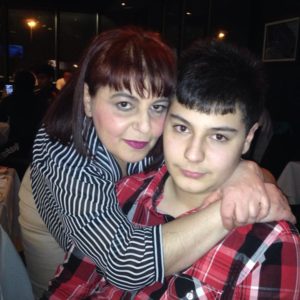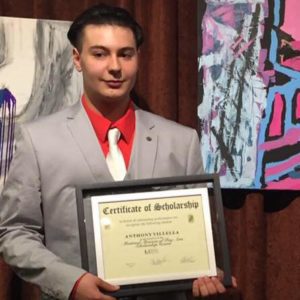Have you ever felt a little alienated around a group of people? Maybe because you’re an introvert. Or, maybe you don’t share the same interests. Or, maybe you’re not fast enough, smart enough or strong enough as the others.
Has this resulted in society labeling you as dumb or useless? Or, lazy and a failure? Or, with a disability such as ADHD?
Did you believe it and stick to it?
Now, what if beneath the label lays an unidentified giftedness? A unique talent which has been misunderstood by society, others and yourself.
Cettina Villella and her son Anthony can probably best answer all these questions. From a very young age, Anthony was diagnosed with ADHD. In this interview, Cettina and Anthony talk about the symptoms that resulted in his diagnosis and how after ten years, his unidentified giftedness in abstract art was mislabeled with ADHD.
Meet Cettina Villella
Antonia: How old was Anthony when he was diagnosed with ADHD.
Cettina: He was five years old and had just started kindergarten. Not long afterwards, his teacher asked to meet with me about a concern regarding my son. I was told that he couldn’t sit still and had behavioral issues. On one occasion, she contacted me to discuss a major attention deficiency in my son. She had asked the class to draw a person with a big rock hiding the person. My son was the only kid in the class who drew a big rock. When she asked him, “Ok, but where’s the person,” he answered in total frustration, “But, you said the rock is hiding the person.”
“He has trouble understanding simple assignments,” she said, “He is not able to stay focused on what is being discussed and follow along like the other kids.”
The school kept calling me about the fact that my son only wanted to play in the classroom and didn’t want to stay seated in a chair.
Then one day, I received a phone call from the teacher asking why my son wasn’t in school. I argued that I had dropped him off that morning and watched him walk through the doors inside the building. They kept insisting that he wasn’t in school. They had me so worried that I decided to go back and find out what had happened to him. On my way there, she called me back to say they found him playing basketball in the gymnasium. This is when they told me that they had enough. “He’s like a live wire,” they said, “He needs to be placed in a special program for kids with ADHD. We can no longer handle him.”
I met with a social worker who explained the process and my son was put on a list to get into the program at the Montreal Jewish hospital. When I met with the doctors who evaluated him for ADHD, they told me, “The report we received from Anthony’s school made him seem like a monster. He is not a monster but we will accept him in the program since he has been removed from school and has already been enrolled in the program.”
After the Christmas holidays, they told me that my son did not belong in this program. “We handle children with bigger issues than Anthony. He has trouble paying attention but he’s not a monster. He’s a just a child who likes to play.” I chose a different school and he was slowly integrated back to school.
Antonia: How did he transition in the new school?
Cettina: Although the hospital determined that Anthony was not a monster, they spoke to my husband and I about the option of putting him on Ritalin. My son had expressed how much he wanted to be like the other kids and be able to stay focused. So, I saw an opportunity that would relieve my son’s anguish and despair. Besides, this came from highly reputed doctors and I trusted they knew what was best for my son.
Yes, when my son started taking Ritalin, he was an angel. He was calm, he was focused, and he was the perfect student in the eyes of the school system. But, I felt I had completely lost my son. This was no longer my son. I missed him. I missed my son!

I missed him making me laugh. I missed having my son wanting to play with me. I missed his crazy, funny ways of doing things. He had become a vegetable. He had stopped smiling. Yes, he could sit still, clean up after himself and pretty much listen to instructions. But, I wanted my son back, not just his physical body but, his beautiful, humorous true self spirit back.
Antonia: How long did he take the Ritalin?
Cettina: We tried getting him off it when he was in the fourth grade. But, he asked for it and called his doctor to put him back on it. So, he started taking it again.
Then in the fifth grade, he developed a tic, a twitching of the head and shoulder shrugging. The doctors said that Anthony didn’t have to get off the Ritalin. His tic probably had nothing to do with the Ritalin. For my husband and I it was practically a blessing and confirmation that our son would be off it and for good.
Antonia: Did this affect Anthony’s behavior and performance in school?
Cettina: Yes, in secondary I (seventh grade) his grades had dropped and was having difficulty concentrating.
Then, the phone calls started again. “Your son is the class clown! Your son is the class clown! He doesn’t take the teachers serious.” He drove them crazy by telling jokes out loud in class and making the other students laugh. Funny thing is that I would very often be told, “Your son is a very intelligent young man. I don’t know why he acts so foolish.”
Anthony had and still has a passion for historical events. He loved doing research on anything related to history. His teachers would tell me, “Our best debate sessions take place when Anthony gets involved. He brings up very good and challenging points. He’s very intelligent.”
Regardless of all this, his teachers requested the intervention of the school psychologist. Once again, he was labeled as having a learning disability.
In secondary IV (grade ten), he was placed in a program called WOTP (Work Oriented Training Pathways), which prepares students like Anthony for the future.
His grades improved but I still received about two phone calls a month to give me a heads up on Anthony’s class clown acts.
Antonia: How did Anthony’s hidden gift in abstract art get discovered?
Cettina: One day, I received a different kind of voice message from one of Anthony’s teachers. The first thing he said was, “Don’t worry Mrs., Villella, Anthony is not in trouble. That’s not what this phone call is about.” He went on to tell me that he noticed that Anthony had a special talent in abstract art. He was letting me know that he would keep Anthony after school to work with him and have him do more paintings.
At some point, this teacher started noticing specific unique techniques that Anthony was using. He decided to contact an organization that works with elementary and high school kids with special talents in abstract painting. They sent someone from the organization to meet Anthony and watch him paint. He was blown away with Anthony’s work and immediately began the process to get his paintings out to the public.
After his first vernissage, the public immediately showed interest in purchasing his paintings. It was the first time I got to see his paintings hung on the walls. I was in total SHOCK! I couldn’t believe my son was able to do this.
From there, he was approached and interviewed by the Montreal Museum of Fine Arts for another vernissage. I have signed contracts with The Museum of Fine Arts (since Anthony was still a minor), giving them the rights to display and sell his paintings with a percentage of the sales. Just a few months ago, Anthony was entered in a contest at the Museum of Fine Arts. The night the winner was announced, another vernissage was held displaying the participants’ paintings. Not only did all of his paintings sell, Anthony came in first place and received a scholarship to continue studying arts at the school of the Museum of Fine Arts.

When he walked up to receive the award, I couldn’t stop crying. For nearly ten years, I was told over and over again that my son was either a monster, a clown, or a failure and so on. Today, he has discovered himself, his hidden treasure, his passion and his journey in life. He has no idea where this road will take him and he will probably face many challenges along the way. But, now he has a direction and is no longer paralyzed by society’s expectations and self-doubt.
Antonia: Looking back now, did Anthony show this special talent in abstract art?
Cettina: Yes! Anthony used to like coloring. He would mix all kinds of different colors together which made absolutely no sense to me. His teachers would tell me the same thing. “Look at the way he draws and colors. He can’t focus and stay within the lines. He’s not creative, he just scribbles all over the place.” Back then, his talent was labeled as ADHD.
His creativity was there, no one understood it. No one knew anything about it. So, it was not that he had trouble understanding; it’s that everyone else didn’t understand him.
I am so immensely grateful to that one teacher who noticed something special in Anthony and acted upon it. He has drastically changed my son’s life in so many ways. I want to give back and tell anyone out there, whether you’re a parent going through a similar struggle with your child OR, going through your own inner struggle in trying to fit in with society’s expectations,
Watch, Observe and Listen! Again, Watch, Observe and Listen either to your child who has been labeled or, yourself.
I am not a professional and maybe your child needs special education but, PLEASE, understand your child first, understand yourself first before just accepting how others have labeled you. There are so many talented beings that may never get to put their gifts out into the world and remain dormant inside.
Don’t allow your child or yourself to be suppressed by society’s or someone else’s rules of the way you should be.
I have seen what it has done in my son’s life.
And now, meet Anthony Villella
Antonia: What do you remember from elementary school and being placed in a special education program?
Anthony: I really don’t remember much about it. I didn’t give it much thought and just went along with the whole thing. Being on Ritalin, I was able to be like the other kids.
It was in high school that I became rebellious. I would talk back to my teachers or walk in ten minutes late for my classes and skip classes, especially math class. I wasn’t interested in school. It was boring and the teachers were boring. I just liked being with my friends.
Antonia: What about your interest in history and other subjects?
Anthony: I really enjoyed challenging my teachers. I loved watching them stutter over a question or argument I would throw at them. I would read history books and have an understanding that had nothing to do with what they were teaching. I enjoyed putting them in a position where they didn’t really know anything besides words written in a book.
I can’t say I actually studied any of it, I just read and could perceive things beyond what they perceived and I would voice it.
I didn’t care about school and the other subjects. But, if I had an interest in something, I would definitely apply myself. At some point, I got interested in chemistry. It was challenging and exciting and I wanted to learn more about it. I spoke to my teacher about exploring it further. He kept telling me that we had to start with the theory. I wanted to get in the lab, he didn’t want so I lost interest. I would not force myself to be interested in something that I had no interest in.
Antonia: Do you remember having an interest in art?
Anthony: I didn’t really like it because every time we would do drawings in class, I was really bad at it. The teacher made it clear to me at a very young age that I was no good at drawing. So, it wasn’t something I ever thought of pursuing because I knew I couldn’t draw. I would scribble with crayons and mix colors but, everyone kept telling me that this was not art. So, I completely lost interest.
Antonia: How did you discover that you were talented and good at it?
Anthony: Well, in secondary IV, I was placed in the WOTP program for kids with special needs. At the time, I was causing trouble, having fun with my friends and smoking weed.
One afternoon during lunch, my friend and I smoked weed and went to art class stoned. The teacher put up a picture of a Gerhard Richter, the famous German abstract painter and showed us one of his paintings. I was stoned so, I can’t remember what he was telling the class. But, it had to do with the way Richter used colors and then asked the class to replicate the painting. My vision was impaired and all I saw was colors, blue and yellow. I picked up a scraper and went with it. That’s it! I was stoned, it wasn’t really me. I got my inspiration through drugs. That’s my secret!
Antonia: Is this the painting that caught your teacher’s attention?
Anthony: Yes. He came up to me and told me that I should keep doing it. I didn’t believe him. He kept telling me that I had a really good mixture of colors, good taste and good technique. He said that he would mentor me after school.
I was always stoned when I worked on a painting because I believed that this was the only reason why I was good at it. At some point, I got caught with weed and my family got really angry. Then, when my uncle, whom I was really close with, passed away, I promised that I would never do it again.
So, since his passing, about a year and a half ago, I stopped smoking weed. I was very nervous about the upcoming vernissages because I would be painting without the influence of weed. But, I didn’t care. I was used to not being good at something.
Instead of screwing up, my creativity bloomed. My paintings were better than anything I had done when I was stoned.
This was extremely overwhelming for me. All my life, I was convinced I was no good at anything and a failure. I was convinced that to be successful, I had to get a degree. I knew that was never going to happen. I felt completely lost and confused about my future. Now, I was finding out that I was actually really good at this. People were interested in my work. People were purchasing my work. People were noticing me and wanted to help support me in pursuing it further. I had discovered something I really enjoyed doing and it was receiving a positive response. This is all new to me.
I still can’t believe it’s possible. I’ll be very honest, if this hadn’t happened, I would have definitely turned to crime. In my mind, it was clear. I was not good at anything that society considered as a way of earning a livelihood. I just couldn’t see myself going to college or university studying all kinds of stuff I had absolutely no interest in. The only thing left for me was crime in the streets. I knew it would lead to no good. But, this is the only thing I felt I was good at; being bad and being a trouble maker.
I know now that I am good at abstract art. It’s a discovery that’s hard to explain. Discovering who I really am. That the reason I felt I was no good at anything is because I had no interest in what others were telling me I should be doing. I found a passion, an interest that I can turn into a career. The first time I had someone come up to me and say, “Can I buy your painting?” I couldn’t believe it. It hit me. I could actually do something I love as a career, not just a hobby.
That night when I won the award, I walked up to my teacher and said, “You have no idea how you’ve changed my life!”
“Every blessing ignored becomes a curse.” -Paulo Coelho






